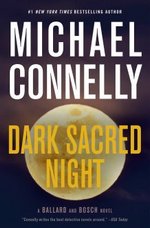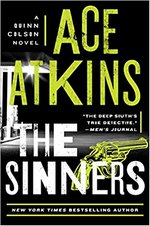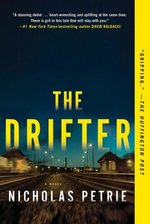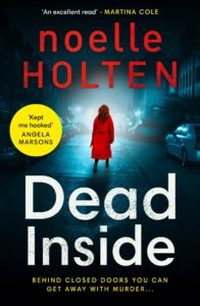 Dead Inside
Dead Inside
by Noelle Holten
Series: DC Maggie Jamieson, #1Kindle Edition, 293 pg.
Killer Reads, 2019
Read: June 1 – 3, 2019
I honestly don’t know what to say about this gobsmackingly good mystery. There are so many things I want to say, but I’m quite aware that no one will stick around to read all of them (and, well, I have to go to work, too — I don’t have that much time). I’m very tempted to leave my mid-point check in to stand, I inadvertently hit the essentials that I’d want to talk about now. I’m also thinking of a rant about the really lousy book blurb (no offense to anyone) because you keep waiting for all the events it describes to occur, and it was late in the book for all of it to happen — which I found distracting. But what do I know, might be too hard a sell without it. There’s no way I can do justice to all the characters — we’re talking a cast the size of Abercrombie’s The First Law or Martin’s A Clash of Kings. I could talk about how this could be an extremely preachy, issues book — but Holten so skillfully dodges that, letting the circumstances do the work while she tells a compelling story — and ultimately that’s more effective (and affecting) than the alternative. I could go on and on about the way that Holten constructed the mystery component of this novel — with enough suspects to satisfy Agatha Christie or Rex Stout, cleverly placed clues (and red herrings), and a very satisfying reveal or two. Or I could speculate about why someone who so clearly knows what she’s doing could introduce a series character with a book that doesn’t focus on the series character.
See what I mean?
Let me start with this and see where I go from here…yup, that’s right. It’s stream of consciousness time, boys ‘n girls. Outlines are for wimps.
The day this released, I wrapped up reading another book — which had this great ending (that I didn’t expect) — a wistful, romantic, ending to a fun, funny and exciting read. I was in a great mood, and noticed that I had more time before dinner would be ready, so I decided to dip my feet in the water with Dead Inside. I read the prologue — a first-person near-nightmarish description of fearing what her drunk husband would do to her when he got home and pretending to be asleep to delay the inevitable (all for the sake of the little girl on the other side of the wall). So much for that happy mood — this prologue is one of the best bits of writing I’ve had the pleasure to encounter this year — it can compete with some of the best of The Power of the Dog — culminating in two sentences that shattered me. I remember practically dreading returning to the book after that, I wasn’t sure I could handle 400 pages of intensity. Thankfully, I was able to get back to that good mood by remembering the other book (and, sure, spending time with the people in my life that aren’t fictional creations). But that prologue stuck with me until I was able to get back to the book (although, almost a week later, I haven’t totally shaken it).
A quick, but important, aside: I know several of my readers have a pretty strict “No Rape” policy — and I’m not one to convince anyone against that. Rapes happen in this book — but you don’t get a play-by-play. It’s all either in past tense (e.g., “my husband raped me,” “sex was forced”), or an expression of fear that it might happen. It’s all matter of fact, completely un-exploitative, and necessary. If that’s too much, so be it — spare yourself putting this aside and don’t pick it up. But speaking as someone who has DNF’d in the past because of rape scenes, I’m telling you this is the way it should be dealt with in fiction.
Now, following the Prologue, the book drops the first-person narrative, pulling us back to a more detached third person as it introduces us to a large cast of characters (the comparison to Martin was hyperbolic, but it doesn’t feel that way) — domestic abusers, domestic abuse victims, people in denial about being either of those, probation officers, police officers, police consultants, and so on.
The novel largely focuses on two characters — and I will, too — but there are plenty of other candidates. First, we have DC Maggie Jamieson — temporarily reassigned from a Homicide team (for reasons alluded to, but not really made clear — for her good, though) to a new team focusing on domestic abuse. The whole “reassigned to get away from homicide” part doesn’t work out too well for her when the domestic abusers her team is supposed to be working with start being killed. She’s smart, ambitious, haunted — an interesting combination, to be sure. She’s a good cop, and it’s nice to see that when it happens. Maggie happens to be the series protagonist, but you’d be excused if you didn’t pick that up until the last chapter. Our other person of focus is Lucy, a tough, no-nonsense probation officer working with the same population (largely). At home, however, that toughness disappears to be replaced with a timid spirit focused on placating/not angering her husband so he won’t beat her (or worse). The two “versions” of Lucy really couldn’t be more different from each other without an MPD diagnosis (or an origin story by Stan Lee). The Prologue, we quickly learn, was from her Point of View and things haven’t gotten better for her since then.
These two are surrounded by compelling, damaged, and well-fleshed out characters. Not every man is depicted as an abuser/potential abuser — and many of those who are depicted in that way are done so with a little bit of empathy for what made them that, while not flinching from condemning their actions and the pleasure they derive from it. Similarly, not every woman is depicted as an abuse victim or enabler. Some are — and they’re shown with the same kind of empathy. Thankfully, some of the damaged men and women are shown as hard workers, trying to make the world better, despite their own circumstances. It’s good to be reminded those people exist.
In short, Holten writes humans, not caricatures or types.
Not only is the cast of characters large — so is the suspect list. The only people in the book not worthy of suspicion were the murdered themselves (and at least one of them would’ve were on the list for a bit). Holten did a great job of giving the reader reasons to suspect everyone. There was a pretty significant clue introduced about one character and I put in my notes that it was a goof on her part, or the most scarlet of red herrings you could imagine. My favorite candidate turned out not to be the one — I didn’t figure they would be, I was just relishing the idea of one particular dark horse. The perpetrator/perpetrators (I’m not telling) is/are the only real possibility(ies) at the end of the day, everything clicked for me about the time it clicked for the police — and yes, I’d considered the correct solution, but liked my idea better until I saw what Holten was doing. A very satisfying solution. Better than the solution — the end of the book is so hopeful it comes as a relief (and feels almost foreign to the rest of the book).
Anyone who’s taken an Intro to Psychology class knows the syndrome where you start unconsciously diagnosing everyone you encounter/know with some sort of psychological disorder (those who’ve gone on to take Intro to Abnormal Psychology are probably aware of the more acute version of this — how graduate students get through the program with any kind of social life intact is beyond me). I had a version of this thanks to this book — I kept seeing people I work with, saw in stores, etc. as victims, abusers, enablers, and so on. Hotlen got in my head, no doubt about it. As I said the other day, “While I’m loving every second of this book, I’m having a hard time shaking the bleak outlook on life and humanity that seems to be part and parcel of this novel….Seriously, read a few pages of this book and see if you’re not willing to replace humanity as the apex predator with something careful and considerate — like rabid pit bulls or crack-smoking hyenas.”
Dead Inside is not an easy read — but that’s because of the subject matter, the realism of the characters and circumstances, not a problem with the author. This isn’t the cops dealing with a larger-than-life genius serial killer — rather, it’s the everyday reality for too many. Just this time tinged with a spree killer making a grim circumstance worse for some. It’s a gripping read, a clever whodunit, with characters that might be those you meet every day. As an experience, it’s at once satisfying and disturbing — a great combination for a reader. You won’t read much this year that stacks up against Dead Inside and you’ll join me in eagerly awaiting what’s coming next from Holten.
—–





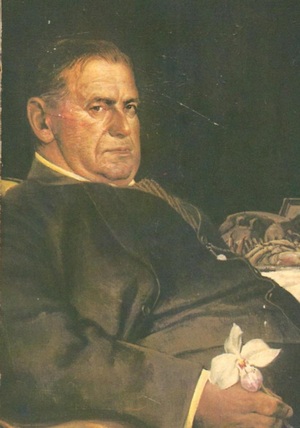 A man condemning the income tax because of the annoyance it gives him or the expense it puts him to is merely a dog baring its teeth, and he forfeits the privileges of civilized discourse. But it is permissible to criticize it on other and impersonal grounds. A government, like an individual, spends money for any or all of three reasons: because it needs to, because it wants to, or simply because it has it to spend. The last is much the shabbiest. It is arguable, if not manifest, that a substantial proportion of this great spring flood of billions pouring into the Treasury will in effect get spent for that last shabby reason.
A man condemning the income tax because of the annoyance it gives him or the expense it puts him to is merely a dog baring its teeth, and he forfeits the privileges of civilized discourse. But it is permissible to criticize it on other and impersonal grounds. A government, like an individual, spends money for any or all of three reasons: because it needs to, because it wants to, or simply because it has it to spend. The last is much the shabbiest. It is arguable, if not manifest, that a substantial proportion of this great spring flood of billions pouring into the Treasury will in effect get spent for that last shabby reason.